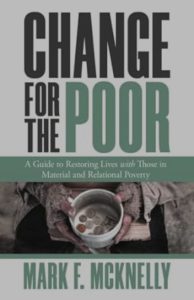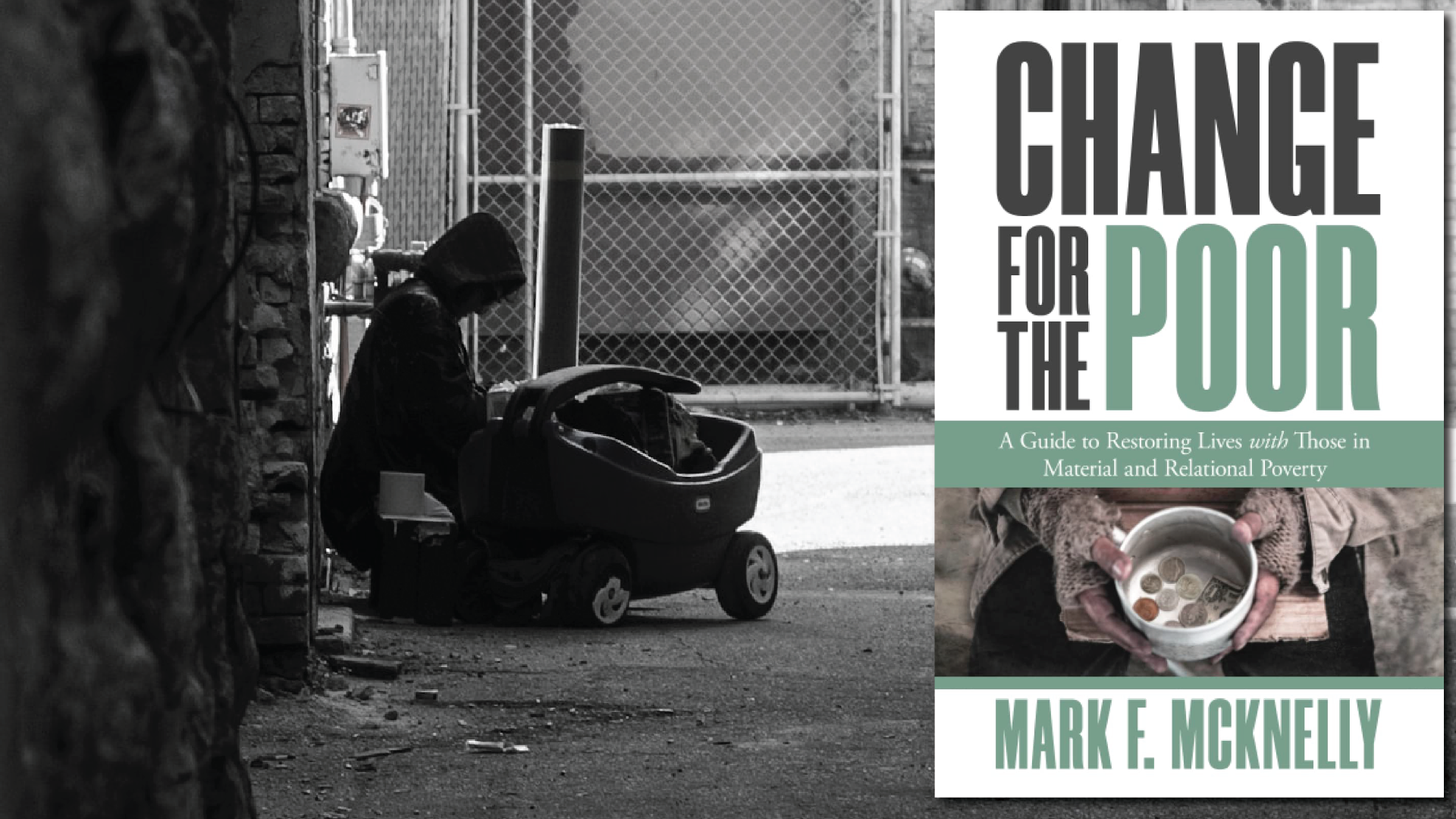A Restorative Approach to Transforming Lives: An Overview of Change for the Poor

Amanda Fisher
Foundations Workshop Coordinator
Read more from Amanda
Jump to:
The Purpose of the Book | The Perspective | The Key Points | Details We Love | Considerations | Who Should Read This?
Change for the Poor provides a philosophical and practical foundation for Christians invested in life restoration for individuals in extreme poverty, specifically those participating in long-term residential recovery.
Through the author’s experience with an addiction that “nearly destroyed” his life, he came to faith in Jesus Christ. God burdened Mark McKnelly’s heart to minister to people in extreme poverty. A former business leader and entrepreneur, he developed a discipleship ministry through his local church. In 2017, he joined the Victory Mission + Ministry team, a True Charity Network member in Springfield, Missouri. He developed the 12-18 month Restoration Program where he continues to serve as leader. The combination of his understanding of recovery on a personal level and his vocational expertise make the wisdom he imparts in this book particularly valuable to those interested in making a long-term difference in the lives of others.
The book is divided into sections based on three vital principles that bring change for the poor: Relationships, Structure, and Accountability.
Relationships
McKnelly encourages restoration ministry workers to take time to uncover their motivation. A person’s reason to help individuals experiencing material and relational poverty must be driven by compassion and empowered by prayer. If their motivation is “more about serving a need you have in your heart, then the person you serve is more of a project to be completed than a person to be cared for.” Because compassion was the fuel that motivated Jesus in his ministry, McKnelly gently encourages the reader to find something else to do if their motivations are anything other.
McKnelly differentiates three types of approaches to helping people: To, For, and With. The “To” approach is transactional/paternal, like writing a check for a person or project. The “For” approach is maternal, such as moving furniture for a disabled person. Although the “To” and “For” approaches are appropriate at times, he encourages Christian servants that the “With” approach is where true life change happens. It is “highly relational and personal, marked by prayer, heart-level truth-in-love conversations, and wholistic support.” This necessary reciprocal relationship, although challenging, is vital for restoration.
Structure
McKnelly emphasizes a highly structured program for individuals in need of restoration. Many in poverty have only experienced chaotic environments with little to no routine, rules, or expectations. He provides detailed information regarding the specific phases of the 12-18 month commitment, including a model for a daily schedule.
The elements of the program are called the “Five Areas of Wholistic Change”:
- Spiritual
- Relational
- Personal
- Vocational
- Financial
McKnelly gives detailed implementation ideas for each area and emphasizes that ignoring any of the five is detrimental. The graduates who experience long-term success are restored in all five areas.
Accountability
McKnelly addresses holding individuals accountable to the program covenant agreed to upon Phase 1 entry. Each phase offers an increased amount of freedom, and it is vital to develop and communicate very specific expectations. Although the details may seem like “overkill,” they help avoid frustration and increase the participants’ likelihood of staying out of financial poverty after leaving the program.
Peer accountability is vital to success. Individuals in higher phases become mentors to the men just getting started. These “Residential Supervisors” are equipped through a four-month-long Leadership Development Training. They learn the biblical principles of addressing conflict and then shadow chaplains who are responsible for having tough conversations when needed. They put their skills to practice when staff and volunteers are not available or present.
McKnelly discusses addressing individuals who fail to comply with the rules, restrictions, and requirements, which are meant to be “protective, not punitive.” He says there are times when additional accountability measures are necessary. These “Discipline and Restoration Plans” are meant to build character and “correct, not condemn.” He provides specific examples of challenging situations he has encountered when these plans have strengthened individuals.
The author outlines the importance of goal setting and “benchmark” meetings every six weeks. Rather than a hurried list of boxes to check, ample time is allowed for individuals to speak from their heart about their experiences in the program. McKnelly offers advice on using grace while speaking the truth and the value of allowing people to experience the consequences of their choices.
What happens when a program participant stops participating or becomes apathetic? According to McKnelly, “relationship supersedes everything in the restorative process.” Accountability and discipline must be done in an atmosphere of love. He encourages program leaders to be willing to “let go of” people who are not yet ready for restoration. Leaders must be willing to see change in a few rather than impacting many people through relief ministries that, although at times are necessary, “don’t break cycles of material and relational poverty.”
Mark McKnelly’s developmental program aligns with all three True Charity Initiative Pillars. The most effective methods in leading people to live the flourishing life God intends is through locally resourced, challenge-oriented, and outcome-driven methods.
The Restoration Program of Victory Mission + Ministry is focused on implementing challenge, which we believe is integral for any person to develop. Although there is a time when relief is needed in cases of crisis, life change rarely happens as a result of hand-out models. McKnelly’s view of charity as “To,” “For,” or “With” mirrors this messaging. Although it is intuitive that relationships are at the heart of restorative ministry, he rightly concludes that most ministries are transactional rather than relational. He believes, “The deeper you go with the few, the greater potential impact you will have with the many.”
The Victory Mission + Ministry Restoration program holds individuals accountable. Inevitably, there are times that a person must be removed. By doing this in a way that the person knows they are valued and loved, the “change process” is not interrupted thereby allowing individuals to sit with their decision and the consequences that come with it. This aligns with the quote from the 19th Century New Orleans Charity Organization Society often used in True Charity trainings, “Intelligent giving and intelligent withholding are alike true charity.”
McKnelly’s content is excellent as a resource for ministry leaders who work with impoverished individuals in any context. The five program elements, for example, are a great reminder of the importance of each area that requires long-term change in an individual’s life. Most of the suggestions, structure, and real-life examples in this book are gleaned from McKnelly’s experiences in long-term recovery. Although pertinent concepts for all poverty-fighting contexts and valuable information to have, the principles may be less applicable for churches or programs that are just focused on one area (i.e., offering only vocational or financial classes).
Change for the Poor is a must-read for anyone working in restorative, relational ministry. For the person who has been in the field for years, this is a tool for re-igniting enthusiasm and being reminded of the important work to which God has called them. Jamie Myers, Director of Forge, the men’s recovery program at Watered Gardens Ministries, said, “I wish I had this book to read five years ago when I started working in a similar ministry. It would have saved me quite a few heartbreaking mistakes … Restoration is not for the faint-hearted but it is one of the most rewarding ways to serve those who need others to walk alongside them as they build or rebuild their lives. If you are new or seasoned in this sort of ministry, I highly encourage you to read this book.”
Whether read individually for introspection or with a group for discussion, the author provides thought-provoking questions to challenge current thinking and practices, with blanks available for note-taking along the way. For churches or nonprofits starting a new restoration program, these questions will help teams think through their motivations, structure, and processes before launching. For the mature program, the questions will spark conversation regarding effectiveness and inspire improvement.
If you are interested in instruction and inspiration beyond the book’s content, contact Mark McKnelly at mark@changeforthepoor.org for details on scheduling a Change for the Poor workshop. In-depth information including program summary, handbooks, and applications can be found at https://www.victorymission.com/restoration
 Change for the Poor can be purchased at Amazon. If you purchase the book through this link, True Charity will earn a small amount as an Amazon Associate
Change for the Poor can be purchased at Amazon. If you purchase the book through this link, True Charity will earn a small amount as an Amazon Associate
This article is just the tip of the iceberg for the practical resources available through the True Charity Network. Check out all of the ways the network can help you learn, connect, and influence here.
Already a member? Access your resources in the member portal.



